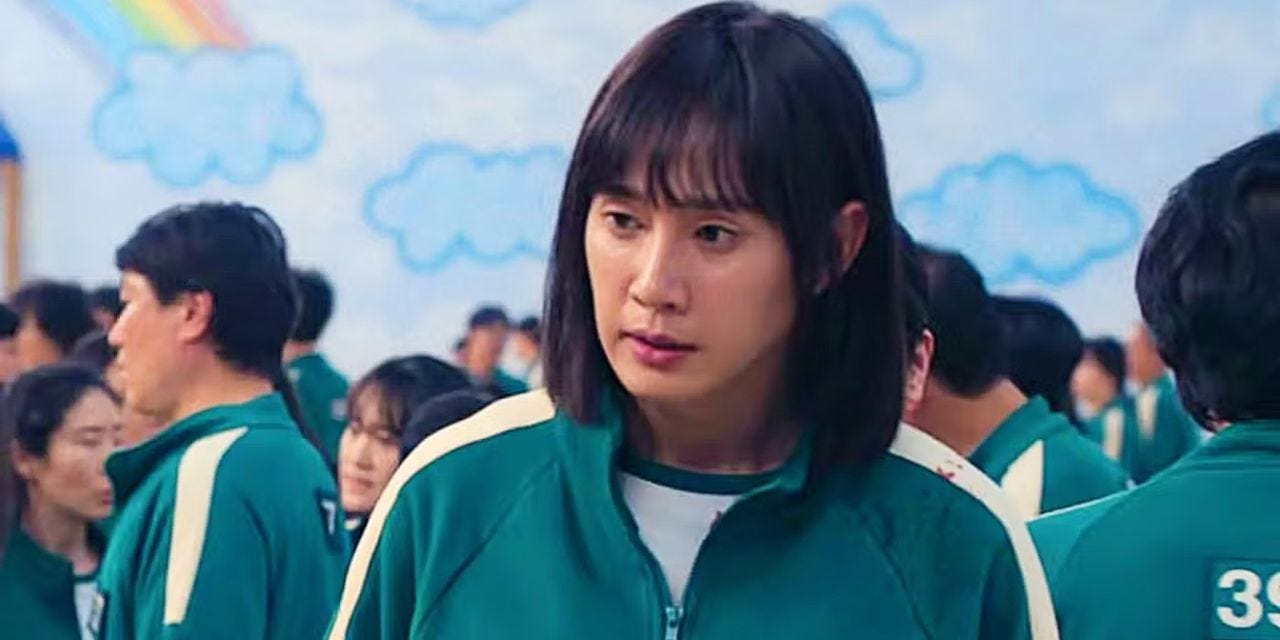The Political Miscalculation of the "Squid Game" Rebellion And How To Avoid It In Real Life
Squid Game is an all-too-realistic allegory.
This contains spoilers for Squid Game. But you can still read it if you haven’t seen the show.
As the first season of Netflix’s Squid Game aired in the early years of COVID, it’s only fitting that the sequel arrived at the onset of the second Trump administration. Just like the premier season, Americans (and I wager the world) were happy to have a distraction from the daily horrors. I know I was.
If you haven’t seen Squid Game, it’s about a group of five hundred players who must participate in deadly schoolyard games to win money. After each game, the survivors vote to leave alive or keep playing for a larger prize. Masked, ultra-wealthy elites enjoy the spectacle of the competition from lavish viewing rooms, watching as the oppressed class fights amongst itself for a chance to win their equivalent of pocket change. You don’t need an art degree to recognize Squid Game as an allegory for capitalism. However, the response to the show quickly created a second level of parody that extended beyond the screen.
I distinctly remember the 2021 cultural obsession with Squid Game. My then-employer had a themed business presentation with the iconic shape-masked guards to explain how we would work from home, and not a day went by that I didn’t see the show used to advertise soft drinks or food delivery apps. Apparently, the hegemony still persists, as Google started a Red Light, Green Light mini-game when I searched about the show.
Just like the participants in Squid Game were blinded by their desire for wealth and victory, members of the working class often overlook the evident failures of capitalism (COVID then, total oligarchy now) in favor of entertainment. The South Korean production wasn’t the only one to reach this status during COVID lockdowns (Tiger King and F1 come to mind), but given that Squid Game carried a fervently anti-capitalist message, its surface-level celebration as opposed to a deeper understanding was exponentially frustrating.
However, despite creator Hwang Dong-hyuk explicitly stating the show is a critique of capitalism, the conservative right still insisted Squid Game was actually about how good capitalism is.1 (Start the below clip at 16:07 and turn it off whenever you feel yourself getting stupider by the second.)
"I think fundamentally what continues to drive this [economic] system is human selfishness and greed. These days I'm becoming more pessimistic about human nature. I almost think that, for homo sapiens, it's greed that allows them to create a society that they feel most comfortable in." - Hwang Dong-hyuk
Perhaps that is one reason why Mr. Dong-hyuk decided to make Squid Game’s second season an explicitly anti-capitalist hammer to beat the message into the heads of oblivious critics. This time around, characters are driven to the games by modern economic woes. Many are bankrupt due to crypto losses, one is penniless after trying to become a rapper, and there are a few want-to-be influencers looking for cash to jumpstart their online careers. The inclusion of a trans woman spotlights how personal bigotries are weaponized by rulers to divide the oppressed class, who are more focused on mocking each other’s personal health choices than they are in uniting to end the exploitative system that will kill them all. Likely because some people (see above) were too dense to get the message, Dong-hyuk created another North Korean defector character to highlight the folly of workers criticizing “communism” while being ground to a pulp by capitalism.
Where season two really separates itself from the precursor is in the characters’ explicit intent to end the Squid Game, once and for all. Now a billionaire thanks to winning the Squid Game in season one, Seong Gi-hun funds private security teams to find the mysterious island and end the bloodbath, once and for all. But when he’s sucked back into the competition, Gi-hun is forced to challenge the game masters from the inside. While planning his proletarian revolution, Gi-hun makes crucial political errors that doom his project to fail. Unlike the other aspects of the show, these mistakes are very real, and are made all too frequently by working-class movements, past and present.





